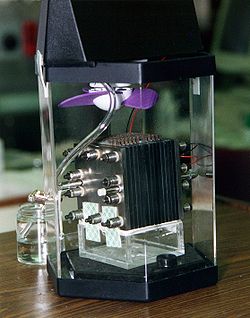
Direct methanol fuel cells or DMFCs are a subcategory of proton-exchange membrane fuel cells in which methanol is used as the fuel and a special proton-conducting polymer as the membrane (PEM). Their main advantage is low temperature operation and the ease of transport of methanol, an energy-dense yet reasonably stable liquid at all environmental conditions.
Whilst the thermodynamic theoretical energy conversion efficiency of a DMFC is 97%;[1] as of 2014 the achievable energy conversion efficiency for operational cells attains 30%[2] – 40%.[3] There is intensive research on promising approaches to increase the operational efficiency.[4]
A more efficient version of a direct fuel cell would play a key role in the theoretical use of methanol as a general energy transport medium, in the hypothesized methanol economy.
- ^ Umit B. Demirci (2007). "Review: Direct liquid-feed fuel cells: Thermodynamic and environmental concerns". Journal of Power Sources. 169. doi:10.1016/j.jpowsour.2007.03.050.
- ^ Ibrahim Dincer, Calin Zamfirescu (2014). "4.4.7 Direct Methanol Fuel Cells". Advanced Power Generation Systems. doi:10.1016/B978-0-12-383860-5.00004-3.
- ^ Keith Scott, Lei Xing (2012). "3.1 Introduction". Fuel Cell Engineering. p. 147. doi:10.1016/B978-0-12-386874-9.00005-1.
- ^ Pasha Majidi; et al. (1 May 2016). "Determination of the efficiency of methanol oxidation in a direct methanol fuel cell". Electrochimica Acta. 199.